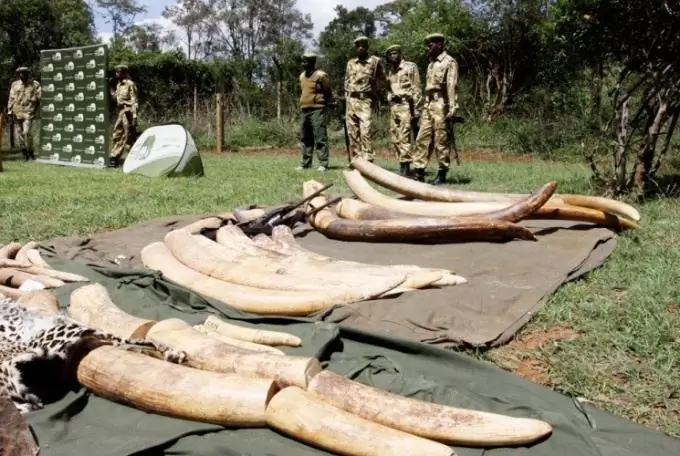- Author Antonio Harrison harrison@cultureoeuvre.com.
- Public 2023-12-16 07:44.
- Last modified 2025-01-22 21:44.
On August 23, the Zimbabwean authorities announced that a large amount of ivory had accumulated in the country, the trade of which is prohibited by international agreements, and asked the international community to allow them to sell some of the elephant tusks.

Zimbabwe is one of the poorest African countries. Mass unemployment and the impoverishment of the people are directly related to the rule of the country's President Robert Mugabe, who is treated very negatively in the world community, considering him a racist and dictator. Back in 1980, Zimbabwe was one of the richest countries in Africa: possessing rich natural resources, including diamonds, it was actively developing, establishing mutually beneficial cooperation with other countries.
Everything changed after Robert Mugabe came to power in 1987. Having carried out a land reform catastrophic for the country, during which the lands of white farmers were seized, he not only did not improve the situation of the indigenous population, but brought it to the brink of poverty. Unemployment in the country reaches 90%, which unwittingly pushes people to poaching.
Elephant hunting has been officially banned in Zimbabwe for years. Until the seventies of the last century, the country was one of the world's largest suppliers of ivory, but the massive destruction of elephants led the world community to intervene and impose severe restrictions on the ivory trade. Since 1975, trade in endangered species of wild fauna has been limited by a specially adopted international convention, which includes more than 33 thousand species of animals and plants. The elephants also fell under the protection of the convention, since its adoption, quotas on the ivory trade have been established, and since 1990 its sale has been completely banned.
As a result of the ban in Zimbabwe, significant stocks of ivory have gradually begun to accumulate, at the moment it is more than 50 tons. Some of the elephant tusks ended up in storage due to the natural death of animals, some of the ivory appeared due to authorized shooting. But most of the tusks were confiscated from poachers. Experiencing serious financial difficulties, the government of the country asked the international community for permission to sell part of the accumulated tusks. Part of the proceeds should go towards maintaining the elephant population.
This is not the first such request, in 2008 the country was allowed to sell 3, 9 tons of ivory. The delicacy of the situation lies not even in the fact that European countries and the United States do not trust President Mugabe, but in the very fact of the possible appearance on the market of a large consignment of ivory. There is no doubt that, along with legal ivory, poaching goods will immediately appear on the market, since it is very difficult to control the origin of elephant tusks. At the moment, everything is simple - the ivory trade is prohibited, any tusks offered for sale were obtained by poachers, since there is simply no other source. With the introduction of ivory from Zimbabwe on the market, poaching is immediately intensified. Therefore, it can be argued that if the world community allows the Zimbabwean government to sell part of the ivory stock, then the weight of this batch will not exceed several tons.






